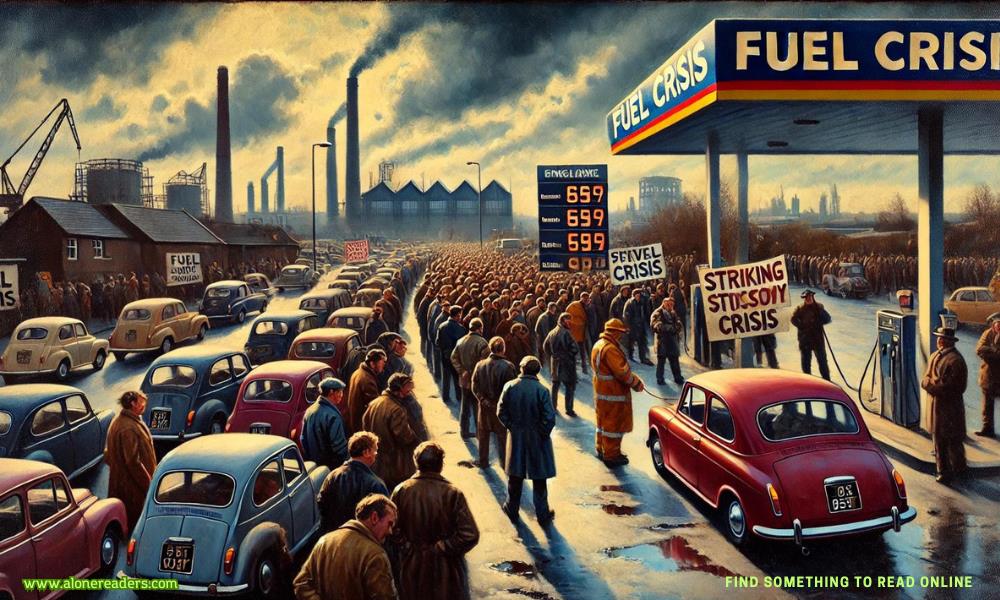
England is grappling with a deepening fuel crisis as energy prices soar and strikes across various industries threaten to worsen the availability of fuel. The combination of rising costs, labor unrest, and public discontent has created a perfect storm, intensifying concerns about energy security and its impact on the wider economy.
In recent months, the United Kingdom has seen unprecedented spikes in energy prices, driven by a combination of global market volatility and domestic policy challenges. The sharp increase in the cost of oil and natural gas has left both businesses and households scrambling to cope with skyrocketing energy bills. Consumers, especially those in low-income households, have been hit the hardest, with many struggling to afford even basic heating and electricity.
While the government has rolled out support measures such as energy price caps and targeted subsidies, these efforts have not been enough to mitigate the impact. Many citizens have expressed frustration, feeling that they are left to bear the brunt of international market forces and domestic mismanagement. This discontent has spilled over into the streets, with protests becoming more frequent and increasingly coordinated.
The fuel crisis has been exacerbated by widespread strikes within key industries. Workers in the energy, transport, and logistics sectors have taken to the streets in protest of low wages, demanding higher pay to cope with the surging cost of living. Fuel tanker drivers and refinery workers, in particular, have been at the forefront of these strikes, causing significant disruptions to fuel deliveries.
These labor actions have triggered fuel shortages at petrol stations across the country, leading to long lines, rationing, and in some areas, panic buying. Many stations have been forced to close, further straining an already stretched supply chain. According to industry reports, fuel delivery delays are likely to persist as strike negotiations drag on with no immediate resolution in sight.
As fuel prices remain high and availability becomes more scarce, public unrest has escalated. Demonstrations in major cities like London, Manchester, and Birmingham have attracted thousands of people demanding action from the government. These protests have been fueled by a broader sense of dissatisfaction with how the current administration has handled the crisis.
In some cases, protests have turned violent, with reports of clashes between demonstrators and police forces. While the majority of protests have been peaceful, the growing frustration has added pressure on the government to address both the immediate crisis and the underlying issues that have contributed to the situation. Some protesters have also voiced concerns over the government's long-term energy policies, including the pace of transition to renewable energy sources.
The U.K. government, led by Prime Minister Rishi Sunak, has been navigating a complex web of challenges. Addressing the fuel crisis requires balancing the need for immediate relief with long-term strategies to ensure energy security. The government has been negotiating with union leaders in an attempt to resolve the strikes, but progress has been slow.
Officials have also urged consumers to reduce their energy consumption where possible, implementing public awareness campaigns on energy conservation. However, these measures have been met with skepticism, as many citizens feel the crisis is beyond individual efforts to cut back. Additionally, the government has been criticized for not acting sooner to secure alternative fuel supplies, with some suggesting that a more robust emergency plan should have been in place.
The global energy market has played a significant role in the current crisis. The war in Ukraine, combined with post-pandemic supply chain disruptions, has led to higher prices for oil and gas worldwide. European countries, including the U.K., have found themselves particularly vulnerable due to their reliance on imported energy.
Adding to these global pressures is the fallout from Brexit, which has complicated energy trading agreements with the European Union. As a result, the U.K. has faced increased challenges in securing favorable deals for fuel imports. These geopolitical factors have placed additional strain on domestic energy supplies, further driving up prices and reducing availability.
The fuel crisis has far-reaching implications for both the economy and the environment. On the economic front, rising fuel prices have had a cascading effect on the cost of goods and services. Transportation costs have surged, leading to higher prices for everyday items, from groceries to consumer electronics. This has fueled inflation, pushing the U.K. toward a potential recession.
The crisis has also highlighted the urgency of the U.K.'s transition to renewable energy. Environmental advocates argue that the country's reliance on fossil fuels has made it vulnerable to such crises, emphasizing the need to accelerate investment in sustainable energy sources. However, the transition to renewables is a long-term goal, and the immediate fuel crisis shows no signs of abating.
As the fuel crisis continues, many are left wondering what the future holds for energy security in England. While strikes and public unrest may eventually subside, the underlying issues of high energy prices and supply chain vulnerabilities remain unresolved. The government faces the difficult task of balancing short-term fixes with long-term strategies to ensure that the country is not left in such a precarious position again.
In the meantime, consumers are bracing for a difficult winter. With energy costs set to remain high, and fuel availability still in question, the situation is likely to get worse before it gets better. For now, the people of England are left waiting for a resolution that may not come quickly enough to avoid further hardship.
Conclusion
The ongoing fuel crisis in England is a complex issue, driven by a mix of global market forces, labor unrest, and public dissatisfaction with government policies. As energy prices continue to soar, and strikes disrupt fuel distribution, the country faces significant challenges in ensuring energy security and economic stability. How the government responds in the coming months will determine not only the short-term relief for its citizens but also the long-term sustainability of its energy infrastructure.